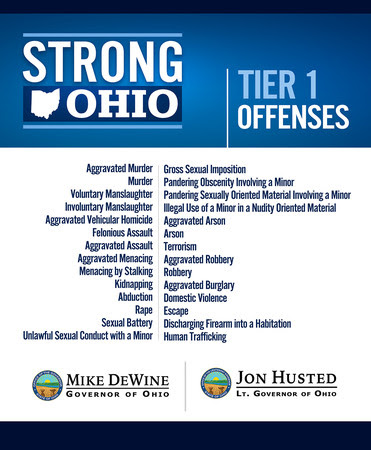(COLUMBUS, Ohio) – As part of his forthcoming STRONG Ohio legislation, Ohio Governor Mike DeWine today announced plans to enhance the state and federal background check systems to better protect law enforcement and the public, increase arrests of wanted offenders, and help prevent the sale of guns to those who are prohibited from purchasing a firearm.
“Our state and national background check systems are only as good as the data they hold, yet a great deal of vital information on dangerous individuals is missing from these systems,” said Governor DeWine. “This lapse creates a substantial risk to the public, to victims, and to law enforcement officers who unknowingly encounter wanted suspects. It is time that Ohio takes action to fix this major flaw.”
More than 1,300 Ohio law enforcement agencies and courts are required to submit case dispositions and certain mental health adjudications to Ohio’s Law Enforcement Automated Data System (LEADS) and the National Crime Information Center (NCIC), but there is currently no requirement for the entry of arrest warrants or protection orders into the state or federal background check systems.
As part of his STRONG Ohio bill, Governor DeWine will ask the Ohio General Assembly to mandate that courts enter final domestic violence, stalking, and sexual assault protection orders into the LEADS and NCIC systems within 48 hours of their issuance. He will also request that Ohio law enforcement agencies be required to enter warrants for serious, Tier I offenses within the same two-day time period.

Governor DeWine’s Ohio Warrant Task Force developed the Tier I offense list earlier this year and recommended that warrants for 28 serious crimes such as murder, kidnapping, rape, and domestic violence be mandated for entry into LEADS and NCIC. In a report issued in May, task force members estimated that there are more than 500,000 open arrest warrants in Ohio, but as of March 2019, only 217,052 of those warrants were in LEADS and only 18,117 warrants were in NCIC, which is one of the systems used by the FBI when conducting National Instant Criminal Background Check System (NICS) point-of-sale background checks for federally-licensed firearms dealers on prospective gun buyers. As recommended by Ohio’s 2018 NICS Compliance Working Group, warrants and protection orders must be entered into the state and federal background check systems to improve the completeness of NICS. “Responsible gun shop owners don’t want to sell a gun to someone who shouldn’t have one, so when they call the FBI for a background check, they depend on the information to be correct. When it’s not, the system is failing not only these business owners, but the public as well,” said Governor DeWine. “It’s time to stop talking about the problem and start working to fix it. Otherwise, these point-of-sale background checks are useless.” Both Governor DeWine’s Ohio Warrant Task Force and the 2018 NICS Compliance Working Group identified the need for an enhanced, statewide system for the entry of warrants and protection orders. To that end, Governor DeWine announced today that Lt. Governor Jon Husted, who is the director of InnovateOhio, has begun the process of developing a free, statewide program to assist with the additional workload that would result from the mandated entry of this important criminal history information. “The current process to enter warrants and protection orders is slow, cumbersome, and costly for local governments,” said Governor DeWine. “I recognize that if we’re asking authorities to do more, we need to help them, which is why I’ve asked Lt. Governor Husted and InnovateOhio to develop a system that will allow for the fast, seamless submission of warrant and protection order information to LEADS and NCIC.” “Our goal is to keep weapons out of the hands of criminals and dangerous people without infringing on the rights of law-abiding citizens,” said Lt. Governor Jon Husted. “But the current background system that is supposed to prevent people who’ve committed violent crimes from purchasing guns often doesn’t work, and we’re going to fix it.” InnovateOhio, whose mission is to use technology in government to improve services, reduce costs, and spur a culture of innovation, will work with the Ohio Department of Public Safety and Ohio Department of Administrative Services to develop the new technology and provide it to law enforcement agencies and courts throughout the state. “Connecting agencies to each other with timely information that would potentially stop someone who cannot legally purchase or possess a firearm will keep our communities safer,” said Bellefontaine Police Chief Brandon Standley who is a member of Governor DeWine’s Ohio Warrant Task Force. “A statewide system will advance the strong calling for better communication, better practices, and better acknowledgment that we won’t accept failures, and we will stand up for those who need us the most.” “These changes proposed by Governor DeWine and Lt. Governor Husted will show measurable results in keeping firearms out of the hands of criminals and the mentally ill,” said Eric Delbert, co-owner of LEPD Firearms, Range, and Training Facility in Columbus. “LEPD and the rest of the industry have said for a long time that we need to strengthen the integrity of the NICS system and build upon its positive attributes. The last thing we want to do is put a firearm in the hands of a criminal or someone who is suffering from mental illness to be used against fellow citizens or law enforcement officers.” Today’s announcement is the latest in a series of steps taken by Governor DeWine to enhance information in the state and federal background check system. While serving as Ohio’s Attorney General, he worked with local courts to improve submissions of conviction and mental health adjudication information to LEADS and NCIC. He also began the development of a new data infrastructure to further ensure the accuracy of state background check results.
|










